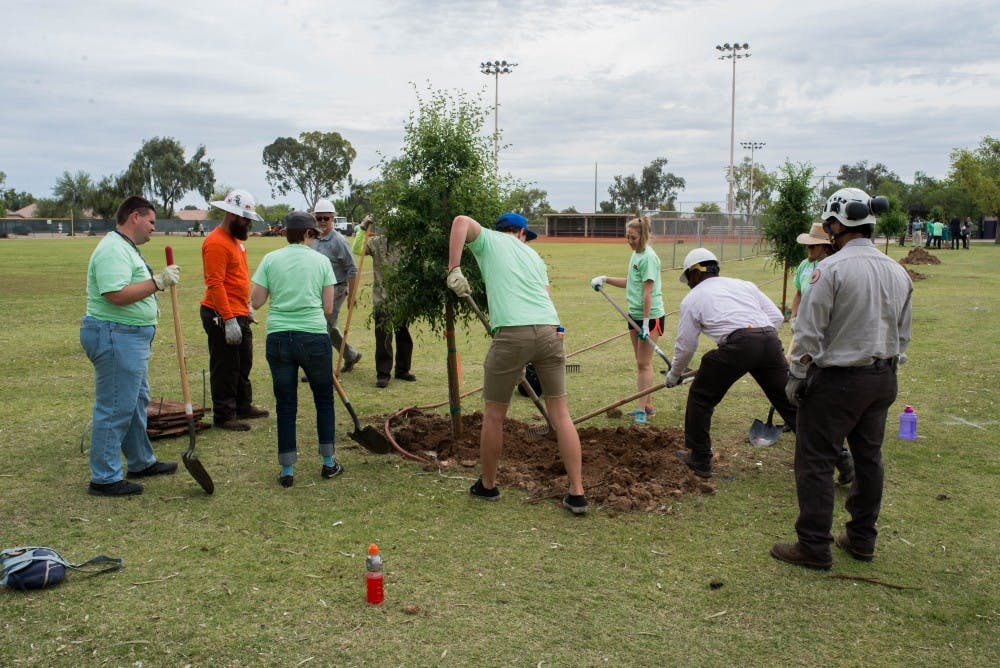The Green Devil Network, in its current form, is a University organization that informs staff and faculty about applied sustainability at ASU.
Now in its fourth year, the network is preparing to make itself accessible to students on the Tempe campus.
Kendon Jung, a Green Devil Network member and overseer for sustainability student leadership programs on campus, said the organization is on the cusp of its structural change.
“We’re finalizing the structure of how we really want to transform students from passive consumers into active participants,” Jung said. “In that, we’re creating various levels of activities that relate to each of the goals that ASU has for sustainability.”
Jung said ASU currently has four major goals for sustainability: climate neutrality, zero solid and water waste, active engagement and principled practice. Four more goals will be added on Sept. 20.
The Green Devil Network will put all eight goals into consideration when crafting the new student version of the organization, which should be finalized later this month, Jung said.
Jung said that he hopes students interested in sustainability will move from interest to action and help to transform the network's model in a way that will be applicable for all students.
“We hope through the Green Devil Network and through all of these different opportunities that exist here at ASU, students will start to see that larger picture,” Jung said.
Doing this requires creating tools that apply to students, said Lesley Forst, who oversees the Green Devil Network on the Tempe campus and is program coordinator for the University's sustainability practices.
“Part of what we’re working on for the student Green Devil Network is developing a student version of that toolkit,” she said.
Currently, staff and faculty members of the Green Devil Network receive a toolkit that includes sustainability tips and practices related to working in an office, Forst said. Now Green Devil members are working to transform the prior network model to apply to students.
The University has made a long-standing commitment to sustainability. Earlier this year, ASU was rated third in the world and second in the U.S. for sustainability initiatives, using the Sustainability Tracking, Assessment and Rating System (STARS) from the Association for Advancement of Sustainability in Higher Education.
“Sustainability is a part of being a Sun Devil; let’s all learn about it,” Forst said.
ASU will host a State of Sustainability event to discuss sustainability practices and ways for students to get involved on Sept. 20, the same day that the University will double its sustainability goals.
Sustainability is especially important for ASU students and other local residents because of increasing temperatures throughout the Valley.
“What can we do to mitigate heat increasing in this bowl that we live in known as the Valley?” said Jung. “What does a future in the Valley look like right now under extreme heat?”
On a worldwide scale, the United Nations has 17 different global goals to help individuals implement sustainable practices in their communities.
Hannah Lira, a sustainability practices senior and student assistant with ASU's sustainability practices program, said she began her journey into sustainability by cultivating her knowledge in informative spaces.
“When I was a freshman coming to ASU, I left my lights on, I didn’t have a reusable water bottle," Lira said. "But the more involved I got — whether it was in class or in a club or going to meetings — I started to learn more and it meant more to me.”
One way students can learn more about sustainability is through the Seeds of Sustainability course, available through Blackboard. The 90-minute self-paced course has two units that demonstrate the ASU's sustainability practices and initiatives. The training is separated into 17 sections, with a video and a list of other resources available in each section.
“We are encouraging freshmen to take it in particular,” Forst said, “But it’s open to anyone so whether you are a senior or a graduate student or a freshman, it should be applicable.”
Forst said the course may soon be included in ASU 101 classes, adding to the nearly 13 percent of ASU courses recognized as sustainability or sustainability-related. In addition, 74 percent of academic departments offer students courses on sustainability.
“If you walk away thinking that sustainability is recycling and composting, then we haven’t done our job right,” Kendon Jung said. “While that’s a baby step to get on the ladder, it’s a larger mindset orientation of leaving the world better than how you found it.”
Reach the reporter at oakao@asu.edu or follow @sayo_akao on Twitter.
Like The State Press on Facebook and follow @statepress on Twitter.




